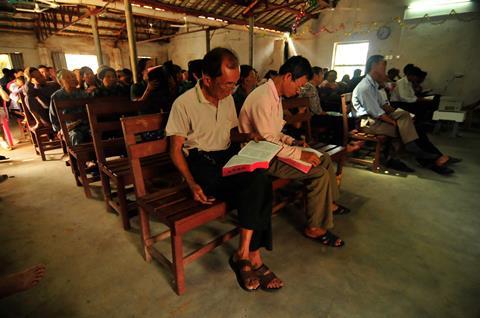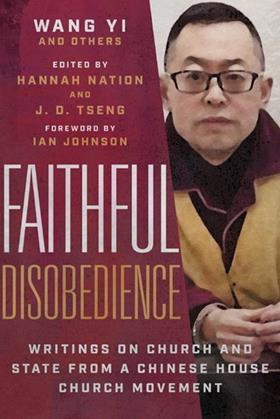Hannah Nation has worked with persecuted Chinese house church leaders on a new manifesto entitled Faithful Disobedience. Their moving stories are a reminder of the true meaning of Christmas, she says

“No one knows where she is either.”
Four years ago, I sat in the car on a cold December night and explained to my mum that not only had pastor Wang Yi of Early Rain Covenant Church been arrested, but so, too, had all of the church’s leadership, and his wife. It was Christmas week and, as we sat in the car waiting to go into a party, I gazed out at a street full of Christmas lights; the dissonance was sharp.
It was also the year that I first truly understood the depths of our Christmas hope.
For many, contemplating suffering during Christmas might seem incongruous or distasteful. Our traditions often – rightly - center on the celebration and joy of our King come to be with us. But a party is not always best for contemplating the God who descended to suffer in a lowly, and lonely, manger.
For those willing, there is an opportunity to also fellowship with those who understand that the light shines brightest in the darkness; that God is truly present even in a lowly, and lonely, jail cell.
Faithful Disobedience (IVP) is a collection of Wang Yi’s writings, translated into English. It is the story of a suffering church - the persecuted church - which helps to teach us the true meaning of Immanuel.
Finding Christ
Before his conversion to Christianity, Wang Yi was a rising Chinese intellectual. A human rights lawyer and legal professor, he was also an avid blogger, film critic and poet. Soon after converting to the Christian faith, he began pastoring a small house church in Chengdu, Sichuan Province. Early Rain Church began to grow quickly and, by 2018, 600 people attended on a Sunday morning.
Early Rain owned property and ventured into Christian education. The church also encouraged families to foster orphans, care for the aging, and participated in relief work during the Sichuan earthquake disaster of 2008. Wang Yi also wrote frequently on topics like the purpose of the Church and its relationship to the state. Around the 500th anniversary of the Reformation, he published a set of 95 theses pertaining to the Church in China.
On December 9, 2018, Wang Yi was arrested, along with his wife, Jiang Rong, and all of Early Rain’s leadership. Over the following days and weeks, roughly half of Early Rain’s 500 members were also arrested, detained, or harassed. In what was clearly an orchestrated attack, the Church also lost all of its physical property and assets.
The church released a pre-written statement 48 hours after Wang Yi’s arrest, titled: “My Declaration of Faithful Disobedience”. In it, Wang Yi laid out his thoughts on what his commitments to evangelism and the church required of his relationship to the governing authorities. This essay was translated into several languages and read by hundreds of thousands of people around the world.
A house church manifesto
Wang Yi’s book, Faithful Disobedience, contains three sections titled: “Our House Church Manifesto”, “The Eschatological Church and the City” and “Arrest and the Way of the Cross”. As I reflect on these at the beginning of Advent, I am struck by the ways in which their topics help us remember the darkness and grittiness of Christ’s birth and the unbending power of the gospel message.
Part one is a collection of writings from Wang Yi and other notable Chinese house church leaders, such as Jin Tianming and Jin Mingri. The writings serve as a manifesto on why the house churches they led chose not to join the government-accepted state Church, the Three-Self Patriotic Movement.
For those willing, Advent is an opportunity to fellowship with those who understand that light shines brightest in the darkness
The driving question is: Where does the church’s ultimate allegiance lie? Does it lie with the state, or with King Jesus? Wang Yi and his fellow leaders are unflinching in their belief that the churches of China are to be subject to Christ alone. He wrote: “whoever wishes to be king of our lives replaces God’s will with their own will or asks for unconditional obedience, worship, and praise— regardless of whether it is our spouse, parents, children, or a nation’s government or political party, regardless of whether it is done with tears or swords.”
I can’t say I’ve ever heard a pastor preach on Church and state relations during Advent, but when we consider the biblical texts, perhaps they should. The message that Jesus alone is King is a deeply Christmas message. In Luke 1:46-55, Mary’s Magnificat speaks of Jesus’s rightful reign, which brings down the mighty and the proud.
Every year we read: “the government will be on his shoulders. He will be named Wonderful Counselor, Mighty God, Eternal Father, Prince of Peace” (Isaiah 9:6). This year, may we consider the full meaning of these words by paying attention to what the Chinese house churches have experienced.
The final destination
Part two reminds us that this earth is not our final home and that the Church, as the temporal expression of Christ’s kingdom, is headed towards a final destination. As Christians, we need to understand that we are going somewhere, and the point of the Church is to testify of the final fulfilment for which we wait. Wang Yi writes: “Do we long for the Lord’s second coming? Do we long for the end of history? There is tension in the end times. There is a tension between what has come and what is yet to come. I belong to the current age and to the age to come. I belong to earth and to heaven. Therefore, we live in this reality.” ‘Eschatology’ might be an intimidating word, but it simply describes what we believe about the end of time and Christ’s reign over the cosmos.
This is a helpful reminder as we think and talk about Immanuel this season. Yes, God came to be with us. But he did not leave us where we are. God’s presence with the Church testifies to his redemptive work and our destiny – eternity in the kingdom with King Jesus.
Participants in the Christmas story knew this to be true and prophesied accordingly. Simon and Anna waited for the revelation of the Messiah, but even when finally in his physical presence, they still looked ahead to a final fulfillment (Luke 2:22-38).
Consequences of following Christ
The final part of Wang Yi’s book contains writings produced in the lead up to his arrest. It deals largely with the consequences of following Christ. Wang Yi makes many bold claims regarding persecution being good for the Church, and calls on all Christians to walk the way of the cross with their Lord.
It is a strong reminder of the violence found throughout the Christmas story – of Herod’s slaughter of the innocents, the flight to Egypt and Simeon’s prophecy regarding Mary’s pierced heart. Wang Yi writes: “every church-state conflict throughout history is a moment in which God’s kingdom moves forward.” We are forced to remember that the stakes have always been high, particularly surrounding the birth of Jesus.
I can’t say I’ve ever heard a pastor preach on Church and state relations during Advent, but perhaps they should
A common idea among house church leaders is that the servant is not above the master (Matthew 10:24) and, therefore, Christians are to expect to participate in the sufferings of Christ. Wang Yi went as far as to claim that: “There is a reason history that Christ has not yet come, and that we will have to wait and rest a little longer: the number of martyrs has not been reached…
“You may be surprised and ask, ‘How can martyrdom turn into hope?’ For believers, we hope for the Lord to come again. Amen! Therefore, we hope for the life of the martyrs. When we see the martyrs, when we see their testimonies, we know that redemptive history is progressing.”
A true mark of faith

The point is not suffering for suffering’s sake. Rather, it is the mark of the kingdom to which we belong. Wang Yi claims “the true mark that shows we truly belong to this kingdom of Christ is not our success, our wealth, or our reputation, but the mark of the cross of Jesus on our bodies. This is a mark that cannot be rubbed away, wiped off, or erased.”
This Advent, through the words of a jailed Chinese pastor, we fellowship in spirit with Christians around the world who have known and understood this truth more consistently than us. We are invited to reevaluate our part in the body of Christ in the light of the perseverance of millions of saints the world around, and to better understand what it means to walk the way of the cross as we are united with Christ. This is the year we ask ourselves if we really believe in a sure hope beyond death.
At Christmas, we celebrate the first arrival of Jesus into this world. But it is his second arrival, in full glory and justice, that will fully end our waiting and bring us into new life. When Jiang Rong was eventually released from detention one year later in December 2019, her Advent did not end. She still awaits the freedom to leave her own home. She still awaits the return of her husband. She is free from her prison, but she has still not received the justice and reconciliation she awaits.
We wait with her, both for her earthly bridegroom to return, but mostly for her heavenly bridegroom. For when he comes, he will ride the clouds of justice and all will be well.


































